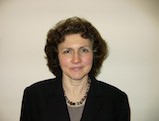External Assessment Panel

Jane Cage
Principal for Insightfive22
Jane Cage provides practical and extensive recovery experience as an experienced community leader and entrepreneur. She currently serves as Principal for Insightfive22, a consulting firm focused on long-term community recovery and resilience. In that role, Cage has co-authored and instructed "The Resilient Community," a series of workshops to teach resilience practices to non-profit organizations that serve vulnerable populations, helping them prepare for and recover from natural disasters.
Before her role as a consultant, Cage served as Chairman of the Joplin Citizens Advisory Recovery Team, a citizen-led group of over 100 community leaders tasked with developing long-term recovery efforts for Joplin, Missouri, after the 2011 tornado disaster. Acting as a liaison between federal, state, and local government representatives, Cage and her team developed a post-disaster recovery vision that brought national recognition for her work. In 2016, Cage chaired the Joplin Disaster Recovery Summit, an event attended by over 300 people from 30 states. She has received numbers of honors and awards throughout her career, including:
Cage received her B.A. in both Economics and Spanish from Wake Forest University. She attended the National Preparedness Leadership Initiative at Harvard University in 2014 and the FEMA Emergency Management Institute in 2016.

Jeffrey Czajkowski
Director of the Center for Insurance Policy and Research (CIPR) for the National Association of Insurance Commissioners (NAIC)
Since February 2019, Dr. Jeffrey Czajkowski serves as the Director of the Center for Insurance Policy and Research (CIPR) for the National Association of Insurance Commissioners (NAIC). The CIPR provides research and education to drive discussion and advance thought leadership as well as action on current and emerging insurance issues amongst insurance regulators, policymakers, industry, and academics. This is accomplished through CIPR’s events, research publications, newsletter and website, the Journal of Insurance Regulation, and its extensive NAIC library holdings.
Prior to joining the CIPR, he served as the Managing Director for the Wharton Risk Management and Decision Processes Center at the University of Pennsylvania, which for nearly thirty-five years has been at the forefront of providing research-based guidance on managing the risks associated with low-probability, high-consequence events such as natural disasters. During his tenure with the Risk Center he also served as a Senior Research Fellow conducting research on various economic and risk-related issues of natural disasters and resilience, as well as on issues of environmental economics. His work has been published in leading risk management, insurance, natural hazards, and environmental economics journals. A significant amount of his research involves working collaboratively in cross-disciplinary research teams and applying research findings through various interactions with top policymakers and senior executives in the insurance industry. This has included serving on the National Academy of Sciences committees, being an academic advisory board member for the World Economic Forum’s Global Risk Report, a member of the Federal Alliance for Safe Homes (FLASH) Resilience Policy Council, a research review board member for the Department of Homeland Security’s Science and Technology Directorate Flood Apex program and a fellow for the Willis Research network.
He holds a B.S. from Carnegie Mellon University, an M.S. in environmental and urban systems from Florida International University, and a Ph.D. in economics from Florida International University. Preceding graduate school, he worked in New York City as a research associate for Coopers & Lybrand Consulting and was a vice-president for JP Morgan. He has taught economic courses at Austin College as well as at Florida International (FIU), Drexel, and Saint Joseph Universities. He was also an adjunct assistant research professor at the International Hurricane Research Center (IHRC) at FIU.

Craig Davis
Water System Resilience Program Manager, Los Angeles Department of Water and Power
CRAIG A. DAVIS, Ph.D., PE, GE is the Water System Resilience Program Manager and the Seismic Manager for the Los Angeles Department of Water and Power, Water System. Formerly he held the positions of Geotechnical Engineering and Trunk Line Design Manager and oversaw nearly a billion dollars in the dam and reservoir development, large diameter pipeline installations, and Water System seismic improvement programs. Dr. Davis is currently developing a comprehensive LA Water System seismic resilience and sustainability program.
He is a California licensed Civil and Geotechnical Engineer and received a B.S. in Civil Engineering from the California Polytechnic State University in San Louis Obispo, CA, an M.S. in Civil Engineering with emphasis in structural earthquake engineering from the University of Southern California in 1991, and a Ph.D. in Civil Engineering with emphasis in geotechnical earthquake engineering from the University of Southern California in 2000. He has worked for the LADWP since 1987 where he has investigated and evaluated numerous dams, managed several multimillion dollar projects, and implemented unique and innovative designs. Dr. Davis is appointed to the National Earthquake Hazards Reduction Program (NEHRP) Advisory Committee on Earthquake Hazards Reduction (ACEHR). He is the founding Executive Committee chairperson for the ASCE Infrastructure Resilience Division. Dr. Davis participates in many other national and international professional committees involved in geotechnical engineering and lifeline system resilience and is the founding vice president of the International Society of Lifeline and Infrastructure Earthquake Engineering. He is involved in the utilization of seismic pipes and instigating development of a resilient pipe industry. He was honored with the ASCE 2016 Le Val Lund Award for Practicing Lifeline Risk Reduction. Dr. Davis has published over 100 technical papers and also organized and coordinated numerous international workshops and symposiums on geotechnical engineering and lifeline system resilience.

Jim Harris
J. R. Harris & Company
Education:
- Ph.D.(1980), University of Illinois, 1980, Structures and Foundations
- MSCE (1975), University of Illinois, 1975, Structures
- BSCE (1968), University of Colorado, 1968, Structures
Professional Employment:
- 1984- J.R. Harris & Company, Principal, Denver
- 1981-84 Structural Consultants, Inc., Principal, Denver
- 1975-81 National Bureau of Standards, Research Structural Engineer, Gaithersburg, MD
- 1973-75 University of Illinois, Graduate Research and Teaching Assistant
- 1969-73 Zeiler and Gray, Engineer and Associate, Denver
- 1968-69 Ken R. White Company, Engineer, Denver
Selected Awards:
- Distinguished Service Award, College of Engineering, University of Illinois, Urbana, 2010
- Life Membership, Structural Engineers Association of Colorado, 2008
- Distinguished Engineering Alumnus, University of Colorado, Boulder, 2007
- National Academy of Engineering, elected 2005
- Walter P. Moore, Jr., Award, Structural Eng'g Inst. of the Am. Soc. of Civil Engineers, 2002
- BSSC Honor Award, Building Seismic Safety Council of the Nat'l Inst. of Bldg Sci, 1997
- Outstanding Public Service Award, U. S. Federal Emergency Management Agency, 1986
Selected Professional Committees and Activities
- American Concrete Institute: Committee 318, Standard Building Code, 1989-present
- American Institute of Steel Construction: Task Committee on Seismic Provisions 1999-present; former Chair, Committee for the Design for Blast Resistant Steel Buildings
- American Society of Civil Engineers: Member 1979-present, and former Chair, Standards Committee for Minimum Design Loads for Buildings and Other Structures (ASCE 7); formerly Chairman, Task Committee on Earthquake Loads; Member 1988-2014 Standards Committee for Loads on Structures During Construction (ASCCE 37); Member, core team for the Pentagon to study building performance in the wake of the September 11, 2001, attacks
- Applied Technology Council: President of Board of Directors 2008
- Building Seismic Safety Council: Member, Provisions Update Committee, chair of committee for the 1985 edition of NEHRP Recommended Provisions (first edition) Mid-American Earthquake Engineering Research Center: former Member, Executive Advisory Board (Chair 2002-3)
- Structural Engineering Institute of ASCE: President of Board of Governors 2008-2009
- Structural Engineers Association of Colorado: President 1990; Snow Load Committee
- The Masonry Society: Board of Directors 2004-2009
Christopher P. Jones, P.E.
Consultant
Christopher Jones is a consultant specializing in coastal flood hazard analysis and coastal building codes. Mr. Jones uses his knowledge of construction and forensic studies to improve coastal hazard mapping and mitigation guidance, and his flood hazard mapping knowledge to inform post-storm damage investigations.
He has been deployed after major hurricanes since 1995 as part of FEMA's Building Performance Assessment Teams and Mitigation Assessment Teams (Hurricane Opal 1995; Fran 1996; Ivan 2004; Katrina 2005; Ike 2008; Isaac 2012; Sandy 2012). He was a member of the ASCE team investigating 2009 tsunami damage on American Samoa.
Mr. Jones serves as chair of the ASCE-24 (Flood Resistant Design and Construction) Standards Committee and the ASCE 7 Flood Loads Task Committee. He is a member of the ASCE Codes and Standards Activities Division Executive Committee. He is a member of the ICC-500 (Design and Construction of Storm Shelters) Standard Committee.

Ifa Kashefi, Ph.D., S.E.
Development Projects Consultant; Former Chief of the Permit and Engineering Bureau, Los Angeles Department of Building and Safety (LADBS)(ret.)
Dr. Kashefi has over 35 years of structural engineering experience and extensive managerial and leadership experience in the private and public sectors. She has excellent knowledge of building and zoning codes, and throughout her career she has overseen, advised and guided numerous development projects smoothly through the permitting process. Before retiring from the City, she served as the LADBS Permit and Engineering Bureau Chief (2008-2018). In her role, she directed the entire Bureau’s operations in 5 offices with over 350 employees. Her responsibilities included leading the Department-wide plan checking and permit issuance operations, managing LADBS Construction Service Centers, developing technical and operational enhancement programs, and enacting the Bureau’s administrative policies. Dr. Kashefi was also a key member on the Mayoral Seismic Safety Task Force for Los Angeles’ Resilience by Design report, which addressed the city’s greatest seismic vulnerabilities and provided recommendations to improve seismic preparedness.
She is an active member of the Los Angeles Tall Buildings Structural Design Council and a past President (2013). Also, she served on the Structural Engineers Association of Southern California (SEAOSC) Board of Directors (2012-2014) and was an involved member and speaker in many of the SEAOSC’s events. She also serves on a variety of other professional organizations, such as the Buildings Subcommittee of the California Strong Motion Instrumentation Advisory Committee. She is a registered Structural Engineer (SE) and Civil Engineer (PE) in the state of California.
Education:
- Ph.D. - Civil/Earthquake Engineering, University of Southern California
- M.S. - Civil Engineering, University of Southern California
- B.S. - Structural Engineering, Aryamehr (Sharif) University of Technology, Iran

Leon Kempner
Principal Structural Engineer, Transmission Engineering (TEL-TPP3), Bonneville Power Administration/USDOE
Dr. Kempner has 41+ years of experience as a structural engineer for the Bonneville Power Administration, USDOE. Assignments have included structural engineering analysis, design, assessment, and research of transmission line facilities (transmission line towers, substation and microwave structures, and seismic upgrade high-voltage transmission line facilities). The last 20+ years Dr. Kempner has been performing seismic evaluation, research, qualifications, standards development, and mitigation design of the Bonneville Power Administration transmission line facilities.
Education:
- University of Nebraska, Omaha, B.S.C.E., Civil (Structural) Engineering, With Distinction, 1972
- Oregon State University, M.S., Civil (Structural) Engineering, 1974
- Portland State University, Ph.D., System Science: Civil Engineering, 1997
National Professional Awards:
- American Society of Civil Engineers (ASCE), Technical Council on Lifeline Earthquake Engineering (TCLEE), Charles Martin Duke Lifeline Earthquake Engineering Award, 2009
- ASCE, Committee on Electrical Transmission Structures, Gene Wilhoite Innovations in Transmission Line Engineering Award, 2001
Member of the following technical committees:
- ANSI/ASCE, Standard 48 - Design of Transmission Pole Structures,
- ANSI/ASCE, Secretary, Standard 10 - Design of Latticed Steel Transmission Structures,
- IEEE, Co-Vice Chair, Standard 693 - Seismic Design of Substation Structures,
- National Electrical Safety Code Subcommittee 5, Overhead Lines (Strength and Loading),
- National Electrical Safety Code, Executive Subcommittee,
- CIGRE, US Representative and Convenor, WG24 "Static and Dynamic loads on Overhead Transmission Lines" of Study Committee B2 (Overhead Line),
- ASCE M-74, Committee on Electrical Transmission Structure Loadings,
- ASCE M-113, Committee on Substation Structure Design,
- ASCE 7, Ice Subcommittee,
- CEATI (Centre for Energy Advancement Though Technology Innovation) International, Overhead Transmission Line Design Working Group,
- EPRI, Inter-Utility Seismic Design Group.
Dr. Kempner has over fifty technical papers discussing structural engineering (analysis, design, and research) of transmission line facilities. He is a registered Professional Civil Engineer (P.E.) in the States of Washington and Oregon.

James Newman
James (Jay) Newman is an experienced public sector leader and advisor.
Jay Newman is a program manager in international development, currently focusing on support for Ukraine and Moldova. Before this assignment, he led and supported international development projects and technical assistance on public financial management, public investment management, disaster risk management, and climate change mitigation and adaptation in The Bahamas, Barbados, Bhutan, Dominica, Ecuador, India, Indonesia, Myanmar, Nepal, Uganda, Uzbekistan, and Vietnam, as well as supporting the overall planning, program development, and management of the Global Facility for Disaster Reduction and Recovery (GFDRR) - based in Tokyo, Japan and Washington, DC.
Before his work in international development, Jay worked for the City of Baltimore in its Department of Finance, as well as its CitiStat performance management office, and covered Latin American financial markets from Santiago, Chile. He received his master's degree in applied economics from Georgetown University and Universidad Alberto Hurtado (Santiago, Chile) and his undergraduate degree in economics and Spanish from Washington University in St. Louis, and has also taught at the master of public administration (MPA) program at the University of Baltimore.

David Rosowsky
David Rosowsky joined Kansas State University as vice president for research in July 2021. As VPR, Rosowsky serves as the university’s chief research officer, providing leadership and expertise in fostering a campus environment that promotes collaborative, interdisciplinary efforts and produces high-quality research and scholarly work. Rosowsky encourages and facilitates the integration and enhancement of research, scholarly and creative activities across the university’s colleges and multiple research centers and leads universitywide strategic research growth activities. Additionally, Rosowsky serves as chair of the board of directors for K-State Innovation Partners, K-State’s hub of corporate engagement, technology commercialization and economic development.
Prior to joining K-State, Rosowsky served as provost and senior vice president at the University of Vermont from 2013-2019, where he drove significant growth in the research enterprise, the launch of several new transdisciplinary centers and institutes, and the creation of a universitywide innovation and entrepreneurship ecosystem.
Since 1990, Rosowsky has conducted research in the areas of structural reliability, performance of wood structural systems, design for natural hazards, stochastic modeling of structural and environmental loads and probability-based codified design. His current research addresses behavior of the built environment subject to natural hazards; modeling and analysis of load effects on buildings and other structures with particular emphasis on complex environmental phenomena; and performance-based engineering for design, post-disaster condition assessment and loss estimation studies. He currently serves on the Editorial Board of the journal Structural Safety and is a past editorial board member of the ASCE Journal of Infrastructure Systems, the ASCE Journal of Structural Engineering and the journal Natural Hazards Review. Rosowsky has authored or co-authored more than 150 papers in peer-reviewed journals and more than 140 papers appearing in conference proceedings. A recognized expert in the field of structural reliability, he has been invited to present his research work around the world including invited lecturers in France, Italy, Switzerland, Canada, Japan, Australia and New Zealand. He has supervised more than 20 master’s and doctoral students. He is the recipient of the ASCE Walter L. Huber Research Prize, the T.K. Hseih Award from the Institution of Civil Engineers (UK) and the ASCE Norman Medal. Rosowsky is a member of numerous editorial boards, national technical committees, is a registered professional engineer and holds the rank of Fellow of the American Society of Civil Engineers and Fellow of the Structural Engineering Institute.

Rae Zimmerman
Rae Zimmerman is currently Research Professor and Professor Emerita of Planning and Public Administration at New York University's Wagner Graduate School of Public Service, following her previous full-time position as Professor of Planning and Public Administration at NYU-Wagner
Dr. Zimmerman also currently directs the NYU-Wagner’s Institute for Civil Infrastructure Systems, initially funded by the National Science Foundation. Her research focuses on urban infrastructure interconnectivity, resilience of public services in extreme events, and the influence of human behavior on services. She also developed graduate courses in these areas. During her over 40 years at NYU, she has had over four dozen research grants that are currently in infrastructure interdependencies and sustainability, COVID-19 related food consumption patterns, climate change, risk communication, and human usage patterns for energy, transportation and water.
Funding sources include the National Science Foundation, the U.S. Department of Homeland Security, and the U.S. Department of Transportation many through university research centers. In these areas she has authored or co-edited a half dozen books, including Transport, the Environment and Security, and authored or co-authored almost 200 other publications and research reports at the intersection of infrastructure and hazards fields, including the direction of public engagement processes in these areas. She is a Fellow of the American Association for the Advancement of Science, past president and Fellow of the international Society for Risk Analysis (SRA) and recipient of SRA’s 2019 Distinguished Achievement Award and 2015 Outstanding Service Award. Her previous professional appointments include member of the first and third New York City Panel on Climate Change and two National Academies committees: the National Research Council Committee on Pathways to Urban Sustainability and the Transportation Research Board Standing Committee on Critical Transportation Infrastructure Protection, co-chairing its physical security subcommittee. URL:http://wagner.nyu.edu/zimmerman
Education:
- B.A. Chemistry, University of California (Berkeley),
- Master of City Planning, University of Pennsylvania,
- Ph.D., Planning, Columbia University,

 News & Updates
News & Updates Photo Gallery
Photo Gallery

 Seminars
Seminars